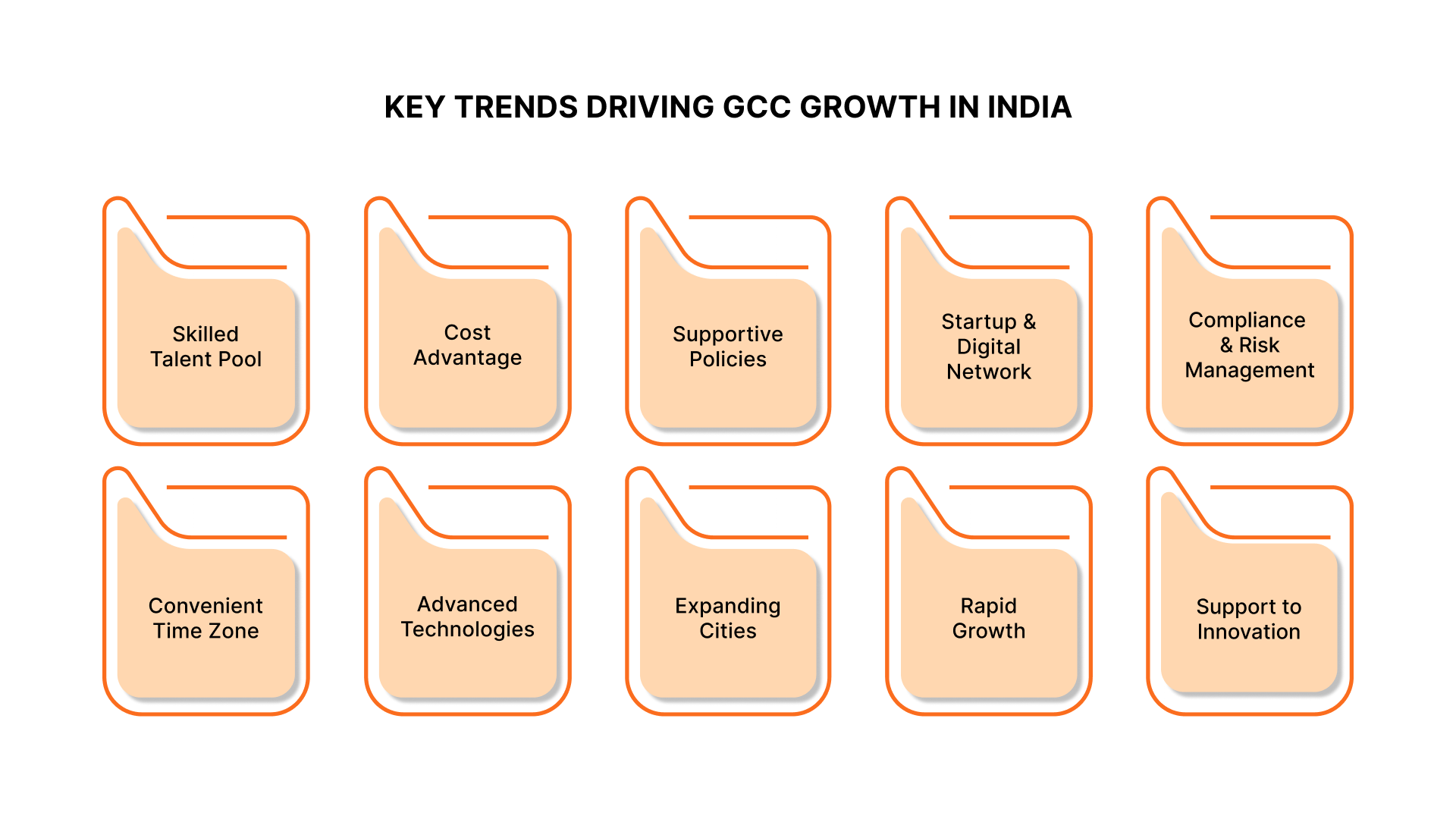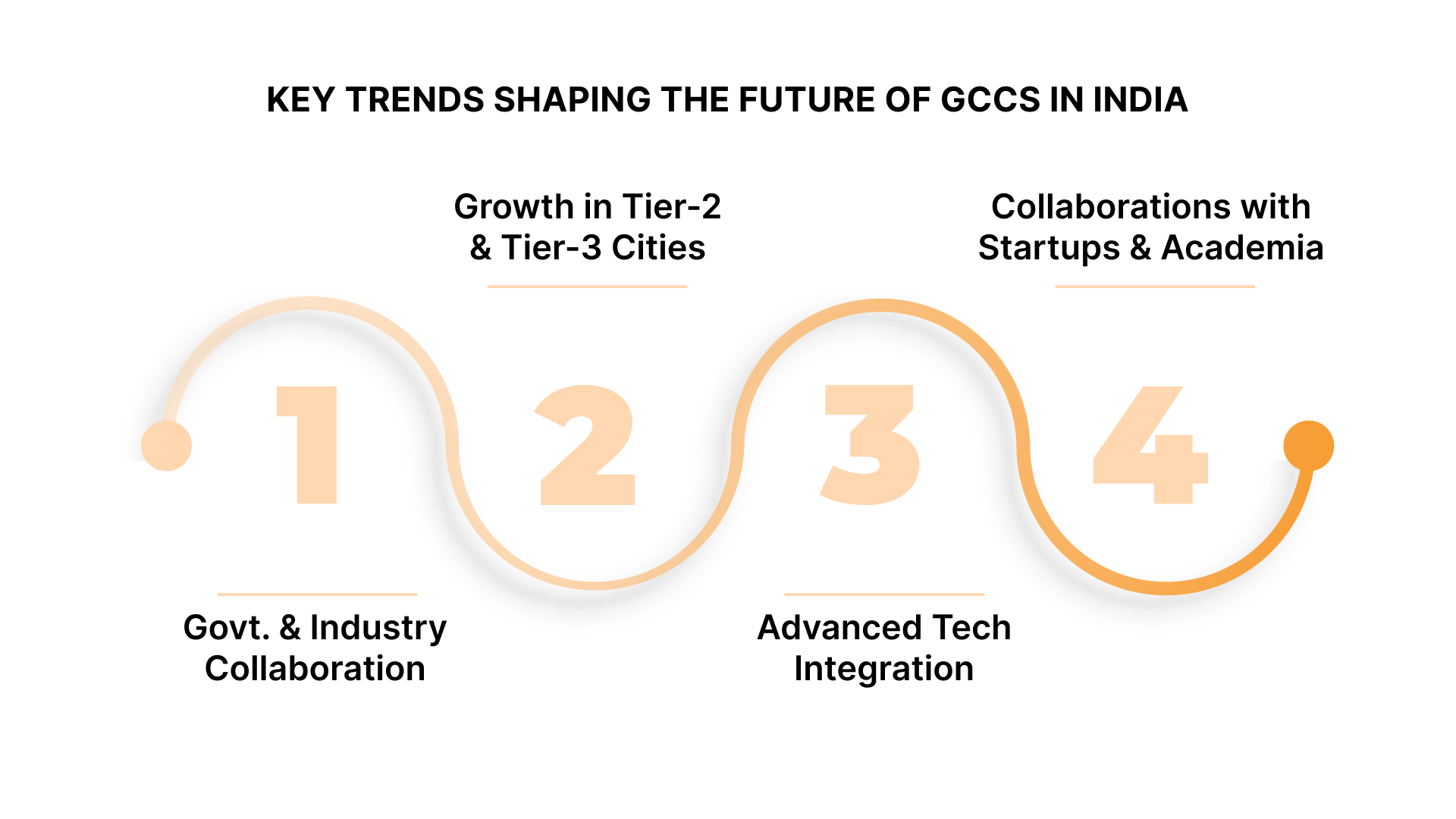India GCCs have become a major force in global business operations. What started as small support offices has turned into large innovation hubs driving technology, product design, and data analytics.
Today, Indian GCC industry is projected to grow to a market size of USD 105 billion by 2030 creating new opportunities across IT, finance, and manufacturing. With more firms expanding into India GCC locations every year, the country is fast becoming a global centre for capability and innovation.
This article highlights the latest trends and growth drivers of India’s Global Capability centres and why global businesses continue to choose India for building their next-generation teams.
At a Glance:
- India leads globally in GCC expansion, offering a strong talent base, cost advantages, and digital maturity.
- GCCs are turning into innovation hubs that lead work in analytics, research, and AI.
- Tier-2 cities are emerging as attractive alternatives for scale and cost optimisation.
- The ecosystem benefits from supportive policies, strong digital infrastructure, and a booming startup culture.
Why Global Enterprises Are Turning to India for GCC Expansion?
The next phase of India GCC expansion reflects a major shift in how multinational companies scale their operations. India has become a preferred location for businesses aiming to build capability, accelerate digital adoption, and strengthen innovation capacity.
Instead of relying only on outsourcing vendors, organisations now invest directly in their own India GCC setups. This approach allows greater control, faster decision-making, and deeper integration with global goals.
What sets India GCC operations apart is access to a vast pool of skilled professionals who bring both technical and domain expertise. These centres handle advanced work in product design, analytics, cybersecurity, and R&D, all from one location.
As more companies choose India to power their global operations, it’s important to explore the major trends driving this growth.
10 Key Trends Driving GCC Growth in India

As the India GCC ecosystem matures, several trends are defining its rapid growth. Together, they highlight why India remains a preferred choice for global companies looking to scale innovation and operations.
1. Large and Skilled Talent Pool
India has one of the largest pools of skilled professionals in the world. Every year, millions of engineers, IT experts, and management graduates join the workforce.
This steady supply of talent helps GCCs in India handle advanced work in artificial intelligence, data analytics, cybersecurity, and product development. These capabilities make Indian GCCs an important part of global business growth.
2. Cost Advantages
Setting up a GCC in India is much more cost-effective than in Western countries. Companies can save on operational costs, which allows them to invest more in research, automation, and new technologies.
This cost advantage makes India a smart and sustainable choice for global companies.
3. Supportive Government Policies
The Indian government has introduced several policies that make it easier to start and grow GCCs. Benefits like SEZ incentives and Digital India programmes have simplified processes for global companies.
Many state governments have also created tech parks and innovation clusters in major and emerging cities, encouraging more GCC investment.
4. Strong Startup and Digital Network
India’s growing startup ecosystem works closely with GCCs to build digital solutions. Many GCCs partner with startups to create automation tools, AI systems, and cloud-based products.
These partnerships encourage faster innovation and help both sides share ideas and expertise.
5. Better Compliance and Risk Management
India’s business environment has become more reliable in recent years. With improved data protection, cybersecurity rules, and clear compliance systems, global companies now trust India for handling sensitive and large-scale operations safely.
6. Convenient Time Zone
India’s time zone makes it easy for teams to work with colleagues in Asia, Europe, and North America. This allows companies to maintain 24-hour operations and respond quickly to global business needs.
7. Focus on Advanced Technologies
GCCs in India are leading the way in using advanced technologies such as cloud computing, automation, and generative AI.
These tools help organisations work faster, make data-driven decisions, and stay competitive in a digital world.
8. Expanding Across More Cities
While cities like Bengaluru, Hyderabad, and Pune remain top choices, companies are now opening GCCs in smaller cities like Coimbatore, Kochi, and Jaipur.
These cities offer skilled talent and lower costs, helping companies spread operations and reduce risks.
9. Rapid Growth Ahead
The GCC sector in India is growing quickly. It is expected to expand by 14% by 2030, the number of GCCs may go beyond 2,550. This growth shows India’s strong position in the global technology and innovation.
10. Moving from Support to Innovation
GCCs in India have moved far beyond routine support work. Many global firms now use their Indian centres for product design, digital transformation, and innovation projects.
Companies like J.P. Morgan, Microsoft, and Walmart have built their Indian GCCs into innovation hubs that lead major technology and business initiatives.
Also Read: Top Trends of 2025 for GCCs in India
Once you see how strong ecosystem have built a solid base, it becomes clear how GCCs are now changing India’s technology and analytics space.
How GCCs Are Transforming Technology and Analytics in India?
India’s Global Capability Centres (GCCs) are driving a major shift in how global enterprises use technology and data.
By focusing on innovation and operational excellence, GCCs are helping companies build stronger digital foundations and smarter business systems. Their growing impact can be seen across multiple areas of technology and analytics.
Here’s how India’s GCCs are transforming these sectors:
- Technology: GCCs in India are at the forefront of enterprise cloud adoption, DevOps, cybersecurity, and product engineering. They help global companies scale faster and maintain operational reliability.
- Analytics: Indian GCCs now handle more than 40-50% of global analytics work, providing deep insights through advanced data modelling and business intelligence that guide strategic decisions worldwide.
- AI and Automation: Many GCCs function as innovation hubs, experimenting with automation frameworks and AI-led solutions to optimise processes and improve efficiency.
As GCCs continue to expand their role in technology, analytics, and innovation, the next big question is about what lies ahead.
What Does the Future Hold for India’s GCC Growth?
India GCC operations are entering a new stage of maturity, moving beyond support functions to drive innovation and global strategy.

With strong digital capabilities, diverse talent, and supportive policies, India continues to be the first choice for multinational firms expanding their global presence.
Here are the key trends shaping the future of India GCCs:
- Stronger Government and Industry Collaboration: Focused policies and initiatives are helping companies expand operations smoothly across major cities.
- Growth in Tier-2 and Tier-3 Cities: Many firms are now building GCCs in emerging cities to access skilled talent and reduce costs.
- Advanced Technology Integration: AI, cloud, and data analytics are transforming how GCCs operate and add value.
- Collaborations with Startups and Academia: Partnerships are helping GCCs stay innovative and future-ready.
As global capability centres continue to grow and diversify across India, having the right talent and workforce strategy becomes crucial for sustaining this momentum. This is where V3 Staffing plays a key role.
How V3 Staffing Strengthens Workforce Strategy for India GCCs?
V3 Staffing helps organisations build and scale GCC operations across India’s top cities with hiring models that balance flexibility, stability, and speed. Each service supports the core workforce needs of global capability centres.
- Permanent Recruitment: Builds reliable, long-term teams across core business functions to support sustained GCC growth.
- IT Staffing: Delivers access to specialised tech professionals such as data engineers, cloud experts, and software architects.
- Contract and Temporary Staffing: Offers quick and compliant workforce deployment for short-term or project-based needs.
- Recruitment Process Outsourcing (RPO): Provides end-to-end hiring delivery backed by SLAs, allowing internal teams to focus on business priorities.
- Executive Search: Identifies and secures top leadership talent to guide GCCs through expansion and transformation.
With its domain expertise and presence across India’s key hubs, V3 Staffing enables GCCs to build strong teams, manage scale, and grow efficiently in a competitive market.
Conclusion
India GCCs are growing fast and becoming an important part of global business operations. With strong talent, better technology, and expanding infrastructure, India continues to be the first choice for companies building capability centres.
To keep up with this growth, organisations need reliable hiring processes that understands India’s key talent hubs.
V3 Staffing helps companies set up and scale their GCC teams through Permanent Recruitment, IT Staffing, and RPO services. With local knowledge and a strong delivery network across Hyderabad, Bengaluru, Chennai, Pune, Delhi NCR, and Mumbai, we help build teams that perform from day one.
Looking to build or grow your India GCC? Partner with V3 Staffing to find the right talent and grow with confidence. Contact us today to get started.
Frequently Asked Questions
Q. What is driving India GCC growth today?
A. Strong digital skills, cost efficiency, and advanced tech capabilities make India the top destination for global capability centres.
Q. Which industries are expanding their GCC presence in India?
A. Sectors like IT, BFSI, manufacturing, and healthcare are rapidly building GCCs in India to manage innovation, data, and analytics.
Q. What are the best cities for setting up a GCC in India?
A. Bengaluru, Hyderabad, Pune, Chennai, and Gurugram lead the list, while cities like Kochi and Ahmedabad are emerging as new GCC hubs.
Q. What challenges do India GCCs face?
A. High competition for tech talent and managing large-scale hiring are common issues. Working with experienced staffing partners helps overcome these.
Q. Why is India expected to remain a global GCC hub?
A. With a large talent pool, digital-first approach, and strong infrastructure, India will continue leading global GCC expansion in the coming years.




